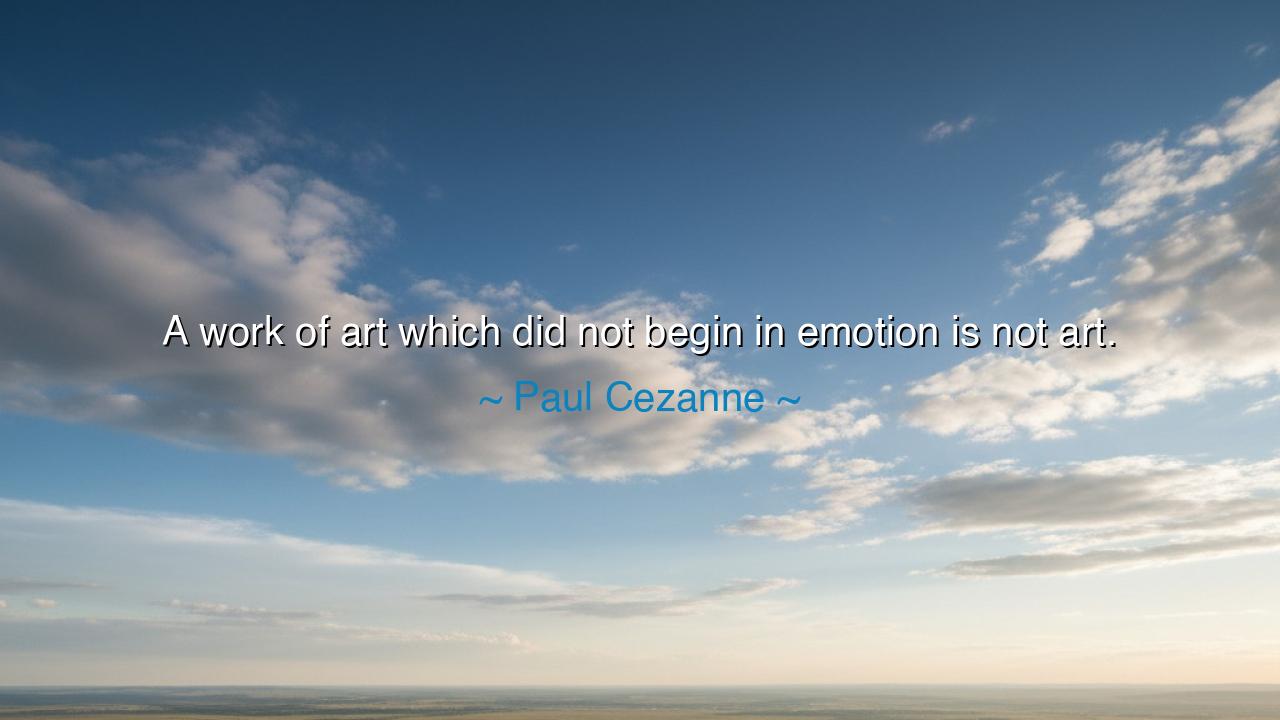
A work of art which did not begin in emotion is not art.






Hear the voice of Paul Cézanne, master of color and form, who beheld the soul of creation and spoke thus: a work of art which did not begin in emotion is not art. In these words he lifts a veil, showing that art is not born from cold reason, nor from idle imitation, but from the trembling fire of the heart. Without emotion, the canvas is but cloth, the stone but weight, and the song but empty sound.
To begin in emotion is to let the pulse of life guide the hand. The artist must feel first—wonder, sorrow, awe, or love—before brush or chisel can awaken truth. Just as a tree springs from living seed and not from lifeless dust, so too must art spring from a living soul. Cézanne reminds us that creation without feeling may produce form, but not spirit; likeness, but not life.
He calls us to see that art is communion between the heart of the maker and the heart of the beholder. When the artist pours his emotion into his work, it flows outward, stirring the souls of those who gaze upon it. But when the hand moves without inward fire, the result is hollow, unable to touch or to transform. True art is thus not craft alone, but craft ignited by passion.
Therefore, O seekers of beauty, do not chase perfection of technique without first kindling the flame within. Cézanne teaches that the essence of art is not mastery of tools, but the courage to reveal the depths of one’s being. Only then does creation rise beyond object and become eternal, carrying within it the breath of its maker.






HMHue My
Paul Cezanne's quote makes me think about how art can be seen as a reflection of the artist’s emotional state. Is it possible that some art, even if created with technical skill, can still evoke emotions in the viewer? What if the artist is intentionally trying to distance themselves from emotion in their work? Can art still be powerful without the artist's direct emotional involvement, or is emotion the driving force behind all great art?
MAMinh Anh
Cezanne’s quote brings up the idea that emotional connection is crucial in creating meaningful art. But what happens when an artist feels disconnected from their work? Can art still be successful if the emotional connection is lost during the creative process? Or does art always require that emotional connection to resonate with its audience? How do artists maintain that emotional connection throughout their work, especially when the process becomes challenging?
YLNhu Y Le
I find Cezanne’s view on art and emotion compelling, but I also wonder: how does this apply to different forms of art? For example, in music or writing, can a piece be impactful if it wasn’t initially driven by emotion, but rather by technique or thought? Is there room for more rational, intellectual approaches to art, or does true creativity require an emotional spark to bring it to life?
NANguyen Ahihi
Cezanne’s quote makes me think about how we often perceive art. If emotion is the starting point, does that mean art that feels too cold or calculated lacks authenticity? Or can the best art be a combination of both emotional depth and technical precision? I’m curious—does the emotional starting point of an artwork guarantee its value, or is it the connection between the art and its audience that makes it truly meaningful?
BNLe Dinh Bao Nam
Cezanne’s quote raises an interesting question about the nature of art. Does emotion need to be present for something to be considered ‘art,’ or can technical skill alone produce meaningful work? I wonder how many artists would agree with this statement, and how many would argue that creativity can come from places other than emotion. Can art that begins without emotion evolve into something meaningful as the process unfolds?